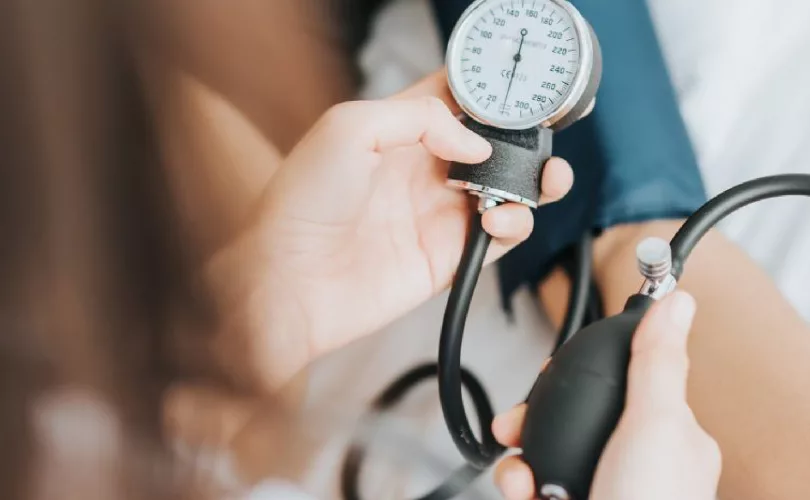Blood pressure is a very important indicator of your overall health. Your blood pressure should ideally be less than 130/80 as this indicates that you are in good health and it will help you to avoid things like hypertension.
So, if you’re wondering what this number means and why it is important for your blood pressure to remain lower than this, you’ve come to the right place!
We’ve compiled an ultimate guide to blood pressure, and why it should remain below 130/80. Let’s dive in!
What Is Blood Pressure?
Blood pressure is a measure of the strength at which your blood pushes against the walls of your arteries.
When you have your blood pressure measured, you will be faced with two numbers. These numbers indicate the systolic and diastolic pressure of your blood.
The first number is the systolic pressure, which is ideally below 130. This is the pressure that is present in your arteries when your heart pumps blood around your body.
The second number, which is ideally below 80, measures the diastolic pressure. This is the pressure that is placed on the artery when your heart is resting in between heartbeats.
For adults, the normal blood pressure is around 120/80. If the blood pressure monitor shows 130/80, this is considered to be high blood pressure at stage 1.
If your blood pressure is often at this level, this can cause quite a number of problems. It is sometimes an indication of hypertension.
What Has An Affect On Your Blood Pressure?
Blood pressure is affected by a large number of different things. Age plays a big part in your blood pressure.
As you get older, your arteries become more narrow. This makes it harder for your blood to flow through the arteries, raising your blood pressure.
Women are much more likely to develop high blood pressure than men. As well as this, eating a large amount, stress or strenuous physical activities can increase your risk of high blood pressure.
Organ problems and other illnesses can also raise your blood pressure.
Why Should Your Blood Pressure Be Kept At A Normal Level?
Your blood pressure is a very important indicator of how healthy you are. If your essential organs are functioning well, then your blood pressure will let us know that everything is working.
Potential Health Risks
If you monitor your blood pressure regularly, this will help to distress flag any potential health issues.
Cardiovascular Disease
High blood pressure can lead to cardiovascular disease for some. Over time, those with high blood pressure experienced damage to their arteries.
When this happens, the blood that is reaching your heart decreases. This can lead to many different cardiovascular problems including:
Aneurysm
If any of your arteries become swollen, they can form a bulge in your chest. Sometimes, this will rupture and cause internal bleeding which is known as an aneurysm. This can be fatal if it is not caught.
Coronary Artery Disease
Coronary artery disease occurs when the arteries that lead to the heart become blocked.
Heart Attack
A heart attack can occur if the flow of blood that is leading to your heart becomes blocked. When the heart doesn’t get enough blood, this results in a heart attack.
Heart Failure
Sometimes, your heart may not be able to pump enough oxygenated blood around your body to serve the other organs.
Enlarged Heart
If your heart is struggling to pump blood around the body, this can result in an enlarged heart. This can lead to other conditions such as a heart attack.
Brain Diseases
Sometimes, high blood pressure can lead to a stroke or other brain diseases. This is caused by poor blood circulation and narrowed blood vessels.
This can lead to lots of different issues with cognitive functions, including:
Stroke
High blood pressure can sometimes lead to a stroke. This is caused by blood clots in the brain that cause severe impairments and death in some cases.
Vascular Dementia
It can also cause an impairment in cognitive function, and other decision-making abilities. This is known as vascular dementia as it causes some similar issues to dementia.
Other Health Issues
High blood pressure can also lead to lots of other health conditions. These include:
Kidney Disease
This is where the blood flow is blocked, causing your kidney function to fail or work less effectively.
Eye Problems
High blood pressure can also damage your eyesight. This can damage the arteries in your eyes, causing things like eye nerve damage and retinopathy.
These problems can lead to blurry vision and blindness if they are left untreated.
How Can You Maintain Your Blood Pressure?
Keeping your blood pressure at normal levels is closely related to maintaining a healthy lifestyle. For some, medications are needed to keep their blood pressure low because they may be at high risk. However, there are a few things that you can do to reduce your risk of hypertension. These include:
Lose Weight
Blood pressure usually increases when your weight increases. As well as this, sleep apnea is linked to being overweight which can raise blood pressure.
If you are hoping to control your blood pressure, losing weight is a great way to do this.
If you’re overweight, losing some weight can help to reduce your blood pressure and your risk of any issues relating to high blood pressure.
Exercise Regularly
It is important to partake in regular exercise if you want to keep your blood pressure nice and low. You should aim for around 30 minutes of moderate exercise every day.
This exercise can stop your elevated blood pressure from turning into hypertension.
Walking, jogging, swimming, or dancing are great examples of some forms of exercise that will work well to lower blood pressure.
Eat Healthily
Maintaining a healthy diet is a great way to ensure that your blood pressure remains low. You should ensure that you eat a diet that is high in fruits, vegetables, and whole grains to maintain low blood pressure.
You should also aim to add potassium to your diet to lessen the effects of salt on your blood pressure. There is usually lots of potassium found in fruit and vegetables.
Limit Alcohol Use
Drinking too much can raise your blood pressure a lot. If you limit your alcohol intake, you have a much better chance of keeping your blood pressure low.
For women, it is recommended that you drink less than one drink per day, and men shouldn’t exceed two drinks per day.
Quit Smoking
Smoking causes high blood pressure, so if you stop smoking, you are likely to be able to lower your blood pressure.
Sleep Well
Getting a good night’s sleep is very important for your blood pressure. If you get less than 6 hours of sleep each night, you are likely to experience hypertension.
A large number of issues can disrupt your sleep, and it is important to try to eliminate these problems.
If you have any trouble sleeping, talk to your doctor or healthcare provider.
Reduce Stress
Stress can contribute to high blood pressure for many. For this reason, it is important to reduce any stress, no matter what the cause.
To keep your stress levels to a minimum, you should avoid trying to do too much. Ensure that you also avoid any stress triggers, and make time to relax.
If you are often stressed when you are stuck in traffic, attempt to avoid rush hour traffic.
Monitor Blood Pressure At Home
It is important to monitor your blood pressure at home if you sometimes experience high blood pressure. This will allow you to understand whether your lifestyle changes have affected your blood pressure.
You should also visit the doctor often in order to ensure that your blood pressure is controlled. If you need any medication, your healthcare provider will talk to you about this. You can also buy your own BP Monitor for easy regular checkups.
Final Thoughts
So, there you have it! If you’ve been wondering why your blood pressure should be less than 130/80, you’ve come to the right place.
We’ve compiled an ultimate guide to why you should keep your blood pressure low, including the risks that come with high blood pressure.







